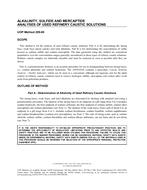
This method is for the analysis of used refinery caustic solutions. Part A is for determining the strong base, weak base (spent caustic) and total alkalinity. Part B is for determining the concentration of sulfur present as sodium sulfide and sodium mercaptide. The data generated using this method are considered quantitative over the concentration ranges generally encountered in these types of refinery caustic solutions. Refinery caustic samples are inherently unstable, and must be analyzed as soon as possible after they are drawn.
Part A, a potentiometric titration, is an accurate procedure for use in distinguishing between strong bases, i.e., sodium phenolate and sodium hydroxide. The APPENDIX contains a procedure, Caustic Solution Analysis – Double Indicator, which can be used as a convenient, although not rigorous, test for the plant control of refinery caustic solutions used to remove hydrogen sulfide, mercaptans and certain other weak acids from petroleum products.
Product Details
- Published:
- 01/01/2000
- Number of Pages:
- 16
- File Size:
- 1 file , 220 KB